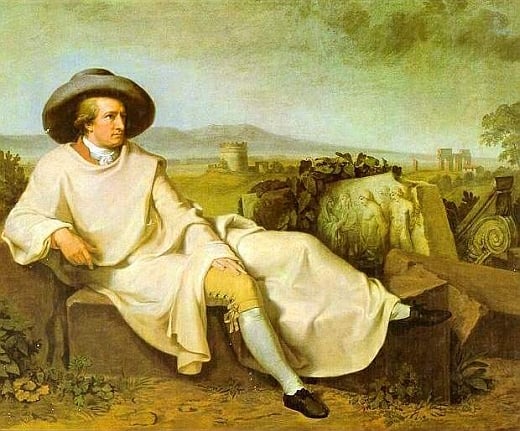A reader writes: “You’re turning everything into a subject for political commentary. Jane Austen? Even Mickey Mouse in his greatest starring role, as the Sorcerer’s Apprentice? Gimme a break.”
So what is that tale of the absentee sorcerer and his young intern all about? Just fun and games? Material for a few gratuitous flights of fantasy? That may reflect Disney, but certainly not Goethe. The “Sorcerer’s Apprentice” – “Der Zauberlehrling” – is a beautiful ballad, one of a great number that Goethe wrote in a productive storm in 1797.
But the story is not just about magic. It’s an admonition. And the subject—the theme for which those spells and charms stand as tokens—is the notion of telling falsehoods in public discourse. You may start this process with good intentions, the narrator tells us, but they will quickly overtake you. The lies have a habit of taking on a life of their own, like those dancing brooms. They will in the end work mischief. They may set the household in an uproar. Or they may bring a nation to war.

Perhaps you see the image already. But there is no doubt that this is the image that Goethe had in mind. Indeed, where did Goethe get this tale? In 1788, his friend Christoph Martin Wieland, a great writer and philosopher and also an accomplished translator from classical Greek, whom Goethe had invited to Weimar and set to work reforming the duchy’s school system, published a translation of the stories of Lucian of Samosata.
Goethe picked up from the middle of the story, where the tale of the sorcerer’s apprentice appears. It’s a story-within-a-story. But how does the whole narration begin? As is his style, Lucian tells us both at beginning and at the end what the object of his story is.
Can you tell me… what in the world it is that makes many people so fond of lying?…
And our narrator then proceeds to catalogue the reasons why people lie. He gives us the well intended, good natured lie—to avoid hurting the feelings of one who would be harmed by an honest judgment, for instance. The socially expedient lie of the “madam is not at home” variety. The lie borne of patriotism and a desire to advance the interests of one’s country, he says. And even the lie borne of necessity, as clever Odysseus’s lies on his perilous journey home to Ithaca.
But most dangerous, says Lucian, are the public men in whom “this passion for lying is ingrained.”
The balance of the satire is a demonstration of this point. And in the end, after a variety of tales, including that of the sorcerer’s apprentice, Lucian comes to ask some questions. He casts them ironically, of course, but they really couldn’t be more serious.
When the people have heard these lies, have been bewitched and stirred up by them, what is the consequence? Lucian says it is useful to think of the lies as a disease, and their recounting as a rabid dog biting the uninfected. He, too, then risks the infection. Is there is no shield to use against this scourge? And Goethe puts this thought very elegantly, in two of the most quoted lines in the German language: “Die ich rief, die Geister,/Werd ich nun nicht los.” (“The spirits which I have summoned/I now cannot banish.”)
Today the National Intelligence Estimate on Iran was published in summary, laying bare another year’s worth of lies from the Bush Administration. Lies which, as usual, were spun with the object of avoiding diplomacy and making war. The same Administration furiously spun lies about the Iraq, leading to a tragic waste of blood and treasure in an invasion and occupation of that country. These are the foreseeable consequences of calculating public lies.
So is there no solution? No master magician to return and set things right? No innoculation to issue? Lucian is very clear on this point. No, there is no sorcerer who will come and make it all better. It is up to us to do so. And in the end it’s about accountability for those who lie, and placing a proper value on the truth. Here is how Lucian finishes the tale:
We have a powerful antidote to such poisons. It is truth… As long as we have zealous use of it, the malicious and foolish lies will not disturb us. We shall have peace.
This is the message at the core of the “Sorcerer’s Apprentice.” It’s a good one for all of us to contemplate today.



